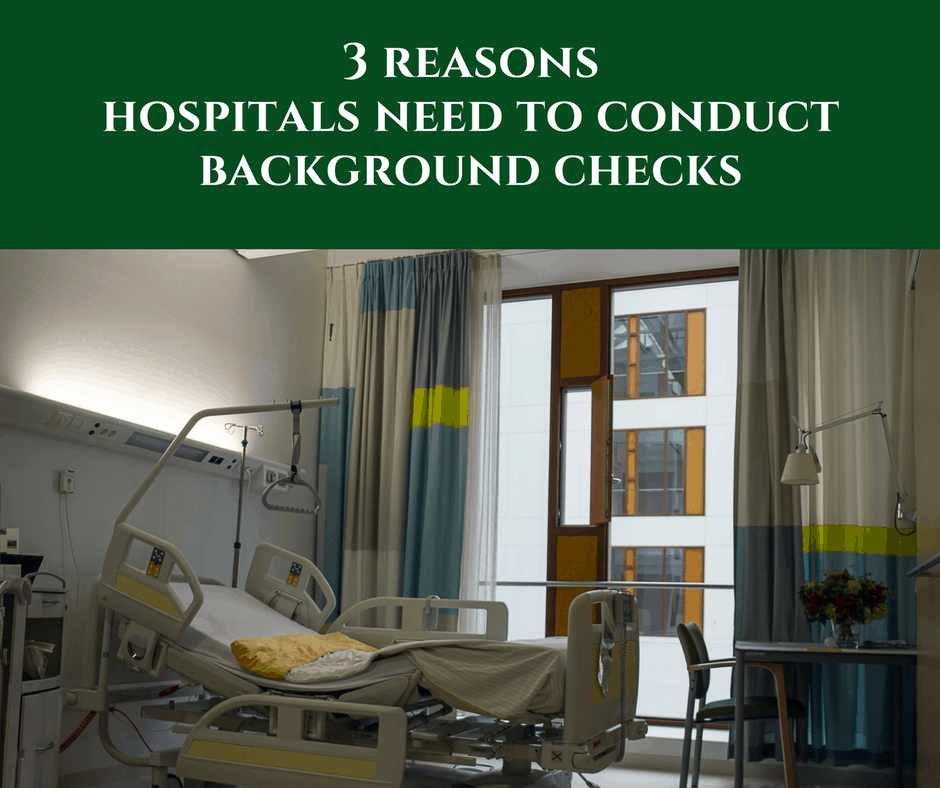3 Reasons Hospitals Need to Conduct Background Checks

Hospitals provide a critical service to the community and are trusted as the ultimate authority in most medical situations, especially those that are urgent in nature. Hospital administration is no easy task, both due to this level of responsibility and the many challenges facing hospitals today. For instance, hospitals operate under strict legal and ethical guidelines, on tight budgets, and with restricted staffing options. Some hospitals deal with unions for nurses and doctors, and some outsource medical coding and other administrative tasks.
Background investigations are important in all industries. For hospitals, however, they couldn’t be more critical. Medical professionals are privy to extensive amounts of confidential information and are responsible for the well-being of patients. It is the responsibility of hospitals to ensure that their hires are qualified, safe, and reliable.
Beyond the basic need to verify the identity and qualifications of a nurse, doctor, or hospital staff member, many state and federal laws exist outlining regulations for licensing and staffing in healthcare facilities. Failure to perform a thorough background investigation prior to hiring can cause legal difficulties for your facility down the line if an employee goes rogue.
Here are three key reasons background checks should be conducted by all hospitals for all hires, both pre- and post-employment.
- The well-being of patients.
There is little more important than the welfare of a hospital’s patients. Performing a Healthcare Compliance Search and a check of an individual’s employment history verifies that have a clean work history, have been compliant with industry regulations, and that they have the experience they claim to. Background checks along these lines can help to protect your hospital from legal action on the off chance that an employee fails to meet your facility’s standards.
- Keeping information safe.
In the medical field, protection of information is treated with nearly as much care as patients themselves. It’s a good idea to check professional references, criminal records, and the sex offender registry to verify that employees don’t have a questionable history. Medical practice background checks are a key part of this process. HIPAA regulations are no joke; your hospital could face severe consequences and employees could lose their licenses if information is not protected properly.
- Protecting hospital equipment.
Hospitals are the go-to place to resolve tricky or life-threatening illnesses and injuries for a reason–they are home to the best-of-the-best when it comes to technology, equipment, and medication. When you bring new nurses, doctors, or staff to the floor, it’s important to verify that new hires have no criminal background, history of theft, or other problematic behaviors before onboarding them. You are entrusting your employees with access to all of this expensive and sensitive equipment. Theft or misuse could not only be costly, it could be dangerous to the lives of patients currently in the hospital.
If your hospital outsources coding, billing, or other administrative work, or uses a staffing agency to fill certain roles, be sure that the other companies involved are conducting background investigations on par with those you use. This is the only way to ensure all individuals working for your facility in any capacity are trustworthy, reliable, and qualified.
For additional information about background investigations, contact Alliance Risk Group today! We are experts when it comes to the background check process. We would love to answer your questions and help you to set up background investigations on any pending applicants.
If you’re interested in reading more blog posts on background investigations, we invite you to do so here.
